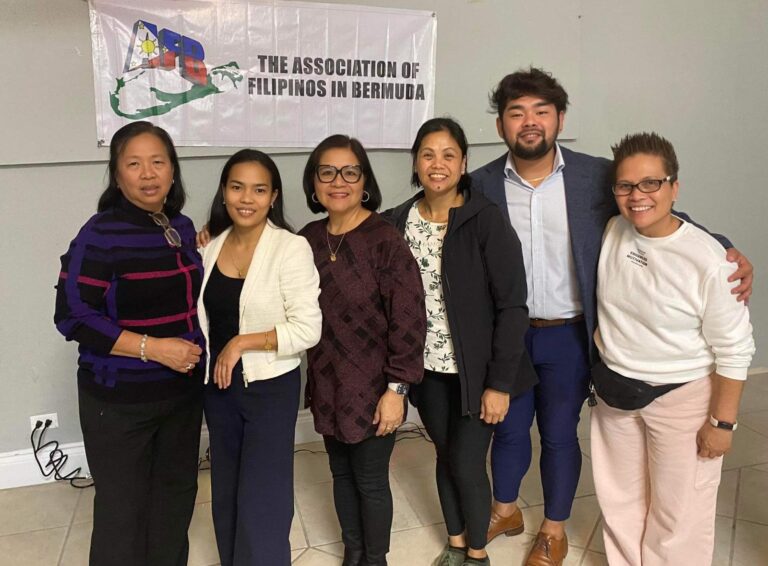The year was 1976. His name was Gonzalo Medina Reyes. He was the first Filipino guest worker to come to Bermuda, opening the door for thousands more to come and be a part of our culture.
In more recent years, there have been between two and three thousand Filipino guest workers living and working in Bermuda at any given time. They add to our society across the spectrum as everything from barbers and beauticians, to reinsurance professionals and accountants, adding a crucial element to Bermuda’s multicultural melting pot.
Ryan de Jesus, President of The Association of Filipinos in Bermuda (AFB), shares his first impression of Bermuda. “I remember on my first day here on the island, a lovely old woman greeted me with ‘Good morning, how’s your day?’ which we don’t do with strangers in our country. That moment sealed an impression that Bermudians have genuine hearts.”
The Association of Filipinos in Bermuda was formed in 1995 to help promote and foster unity among Filipinos residing and working in Bermuda. It aims to encourage and develop the skills and talents of its members through continuous social, cultural, athletic, and educational programmes.
Enticed to come to Bermuda by other nationalities, who are also guest workers here, the main reason our small island is attractive is that their talents and efforts – which make a vital contribution to Bermuda’s economy – are well compensated. Importantly, some of the other factors that made Bermuda an appealing place to relocate to are: our friendly populous, the peaceful environment, and the natural “paradise” of our climate, flora, and fauna.
After a brief hiatus, the Filipino community will once again be participating in the Heritage Day parade. It’s been documented that they first joined the Bermuda Day Parade in 1997, however, some older Filipino residents have said that there were some Filipinos that joined prior to that year. However, as it wasn’t documented at the time, we’re uncertain as to the actual date.
For some background, the origin of many of the early festivals in the Philippines are rooted in Christianity (dating back to the Spanish colonial period where the festivals were vital in spreading Christianity throughout the country). They also tend to feature Islamic or Indigenous influences; and the festivals can still be religious, cultural, or both. These festivals are held to honor the local Roman Catholic Patron Saint, to commemorate local history and culture, to promote the community’s products, or to celebrate a bountiful harvest.
The Philippines has been called ‘The Capital of the World’s Festivities,’ and with hundreds of festivals from the village level, up to the town, city, provincial, and national level celebrations throughout the country, it seems that should be an official title!
Speaking with him about their plans for this year’s parade, I get a sense that Bermuda has something to look forward to.
“We’ll share the festival street dance and music this year,” he notes excitedly. “Festivals are an important part of Philippine culture. These festivals are celebrated throughout the year.”
Here in Bermuda, this year the Filipino group will showcase a mixed festival presentation which combines the festival for a bountiful harvest, and a cultural celebration. In Philippine tradition, May is ‘Flores de Mayo,’ or the month of flowers, thus they plan to use flowers to be their hand props and decorations in their headdresses. They plan to pair the decorations with the ethnic festival beat usually used when street dancing in the Philippines. Will we see the distinctive, traditional dress for males and females in the procession this year? Perhaps learn a dance or two? Let’s see what their presentation this year has to offer!
For those of you who attended Bermuda Institute’s Intercultural Festival on May 9th, you got a small taste of the costumes, dance, and heritage that the AFB may be exhibiting for all of Bermuda soon. You can check out the Subli, Bulaklakan, and Mamang Sorbetero dances on the AFB’s Facebook page.
When asked how important it was to retain their culture while making a life here, Ryan answers, “We believe that retaining our own culture is vital in our lives, because this will make us feel connected to our roots, and also helps maintain our sense of identity and belonging. Nonetheless, we value and cherish the Bermudian culture.”
When asked if they feel that Filipinos are becoming more Bermudian by assimilating into our culture, or if they feel that they are more influencing Bermudian culture, Ryan answers in a very personal, respectable way. “I feel like I’m becoming more Bermudian, or I already adapted the friendly/good manner of being a Bermudian, which is greeting everyone you meet out on the street whether you know them or not.”
If there was a singular thing that Ryan thinks Bermudians should know about Filipinos as a whole, it would be that they are very optimistic people. “We Filipinos are hopeful. In general, Filipinos are incredibly light in spirit, and we are very good at finding the silver lining in our lives.”
It seems they integrate seamlessly. Thank you for enriching our culture.

